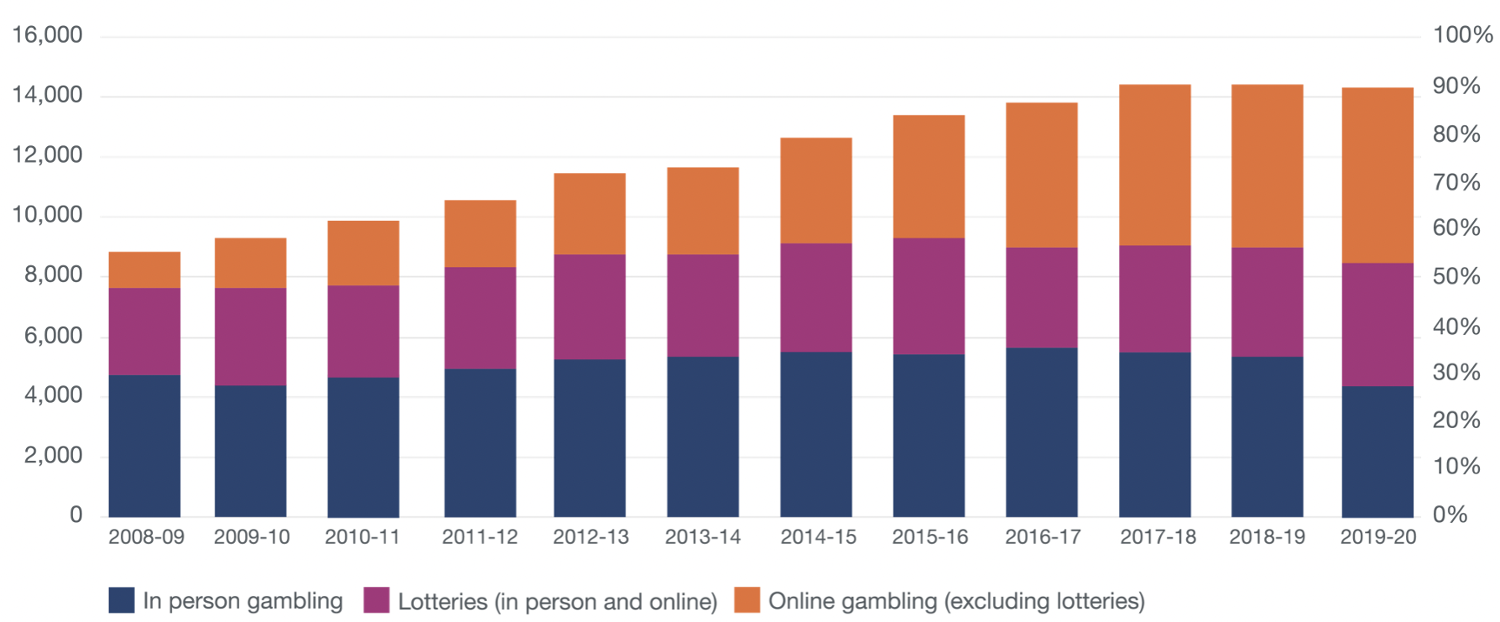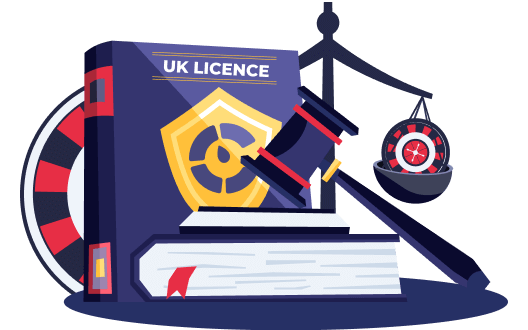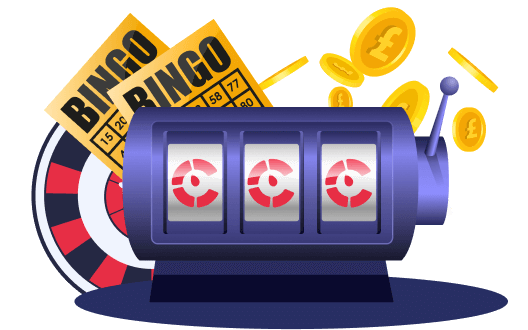Guide to UK Gambling Laws & Regulations
The UK has one of the biggest gambling markets in the world.
In 2021 alone, it generated a revenue of 12.7 billion pounds across almost 2,500 licensed operators. A Gamble Aware report found that 47% of adults, or roughly 24 million people, gamble online at least once a month.
In short, it's big business.

Yet, there's also a dark side to this. The same report found that problem gambling had reached a historic high in 2021. More readily available gambling content than ever (often beamed directly into the player's hands via a smartphone) has made it much easier to place a bet than a decade ago. You can now play a slots game on your tablet, mull over a poker hand via your smart TV or even place a sports bet on your smartwatch.
It all calls for robust regulation, and thankfully the UK is pretty good at that, too.
This guide will walk you through the gambling regulations in one of the world's top gaming markets – the United Kingdom. What are the key aspects? How might they change in the future, and how do they affect you as a player?
Keep reading to find out.
What are gambling regulations?
Gambling regulation, or gambling law, is official legislation that monitors the activities of entities operating in a gambling industry. Typically, regulations are passed through as law within a country or political union, or as part of an independent licensing authority.
When new legislation is written, it's normally referred to as an 'Act' or 'Treaty', such as the UK's 2005 Gambling Act. This can be amended should there be enough support for it among the authorities.
Gambling regulation is an act of law, so those found guilty of breaching it can expect to face a serious penalty, such as a large fine, a winding-up order, or even imprisonment.
The institutions responsible for administering gambling law are known as licensing authorities. These are normally a branch of government, or a government-backed body, that works closely with politicians to amend laws or call for new legislation.
The UK's Gambling Commission (GC) and the Malta Gaming Authority (MGA) are prominent examples of licensing authorities. Acquiring a licence with such authorities is often the only way for a gambling operator to access a particular national market.
There are, of course, many online casinos and sports bettors without a licence. These can, in the worst case, be dangerous to players as there's no way of monitoring their activity or going down an official channel to claim back money. We therefore advise you to stay well away from them and choose safe, licensed options instead!
A short history of UK gambling law
It's a simple fact that gambling has always been a popular pastime in the UK, even back in the Middle Ages. According to historians, if you'd lived in Britain back then, you'd probably have loved card and dice games; that is, except if you were a king called Richard.
The first two King Richards – although around 140 years apart – introduced the country's first gambling restrictions.
- The first, worried by the rise of betting in pubs, decreed that you could only bet a maximum of 20 shillings a day in 1190. Oh, and you had to be at least a knight to be able to do so: anyone lower than this rank was prohibited.
- The second was a little more liberal and just restricted betting to the weekends. But anyone could do it – not just knights.
Despite this, there was no official act for another two centuries. The Unlawful Games Act, passed in 1541 by Henry VIII (yes, it just had to be him) was the first, banning all betting games on Christmas Day. Instead, citizens were obliged to practise archery.
From then on, gambling was frowned on by the authorities, and it wasn't until 1845 that games of skill were legalised in the new Gaming Act. However, it was still illegal to run betting premises, so bookmakers were forced to do business on the street.
Fast forward to the more liberal era of the 1960s, and we see the groundwork for modern gambling regulation laid down. The Betting and Gaming Act of 1960 fully legalised gambling for members of the public. Eight years later, a new act allowed commercial betting premises, albeit with a licence from the new Gaming Board.
Things stayed the same until 2005, when the new Gambling Act became law. This legislation created a new licensing system, overseen by the brand-new UK Gambling Commission (GC), which had three key aims:
- To keep crime out of gambling
- Ensure that gambling is conducted fairly and openly
- Protect children and other vulnerable people from gambling harm.
This created one of the most robust regulatory systems in the world, and a blueprint for other countries to follow.
UK gambling regulations today
As you may have guessed, online gambling influences a large section of UK regulations today.
The Gambling Act received its first update in 2014 to reflect the growth in internet betting and games. It required all operators with British customers to be approved by the UK Gambling Commission, which is why every online casino you see on Casino Meter holds a GC licence.
A drastic increase in online betting among UK citizens (compounded during the COVID-19 pandemic) pushed the British government to review today's laws to make them fit for the 'digital age'. In December 2020, they unveiled a set of tough measures including:
- A complete ban on credit cards
- A maximum of $2 per each betting terminal (FOBT) stake
- At least 2.5 seconds between each slots spin, with quickspin features removed
- A ban on autoplay features
- A requirement for operators to display total losses/wins during a playing session.
Yet, despite these measures, there are still strong calls for further reform of gambling laws, including a mandatory operator charge to help fund addiction treatment, tough affordability checks for gamblers and further stake and prize limits.
A gambling white paper, backed by MPs across the political spectrum, has been in the pipeline since 2019. But when it will finally be released, and what effects it will have on the UK gambling industry, remains to be seen.
How to gamble safely
Having a robust, well-regulated gambling industry is good news for UK players as it means that online casinos must follow rules that look after players' safety and interests, rather than just the casino's bottom line. It also means players have access to problem gambling measures, including self-exclusion tools and professional support services.
That said, it's a good idea to follow a safe gambling routine that minimizes the risk of developing a harmful habit and will no doubt help save money in the process.
Here are a few simple tips we can all follow to gamble in the safest way possible:
- Only gamble with money you can afford to lose
- Never gamble while under the influence of alcohol or drugs, or while feeling depressed or anxious
- Treat gambling as a form of entertainment that you pay a fixed amount of money for (without expecting any return)
- Try out free casino games that let you play just for the fun of it
- Always play at fair and safe casinos.
These simple steps are an extremely effective way to make sure you stay on the straight and narrow.
Start using them today: your bank balance will thank you!
Frequently asked questions (FAQs)
Are all UK casinos regulated?
All UK casinos are obliged to hold a licence from the GC to operate legally: if they don't, they face a heavy fine and/or a winding-up order.
Every casino you see on Meter has a valid UKGC licence, which means it should provide safe gambling tools and subscribe to initiatives such as Be Gamble Aware and GamCare.
Does the UK have the best online casinos?
We can't say if it has the best casinos, but we can say that they are some of the most regulated in the world.
You could have the best casino ever in, say, Brazil, but if it's unregulated then you could run into big problems if something goes wrong. Licensed UK casinos are safe, fun and fair.
Should I play on foreign casino sites?
It's certainly possible for UK players to play on foreign casinos, but if you do, remember to always check whether that site holds a licence or not, as well as the type of reviews it's received from players in the past. That way, you'll get a good idea of its nature.
However, it begs the question: with all the great licensed casinos on Meter, why would you go elsewhere?





